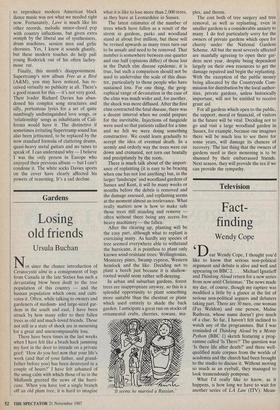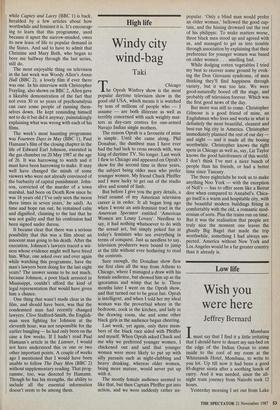Television
Fact-
Wendy Cope
ear Wendy Cope, I thought you'd like to know that serious non-political argument and debate is alive and well and appearing on BBC 2.. . . Michael Ignatieff and Thinking Aloud return for a new series from now until Christmas.' The news made my day, of course, though my rapture was modified a little by a glance at the list of serious non-political arguers and debaters taking part. There are 30 men, one woman (Fay Weldon) and one person, Malise Ruthven, whose name doesn't give much of a clue. So far, I haven't felt inclined to watch any of the programmes. But I was reminded of Thinking Aloud by a Monty Python (BBC 1) sketch featuring a prog- ramme called 'Is There?' The question was 'Is there life after death?' and three well- qualified male corpses from the worlds of academia and the church had been brought to the studio to discuss it. Without moving so much as an eyeball, they managed to look tremendously pompons.
What I'd really like to know, as it happens, is how long we have to wait for another series of LA Law (ITV). Mean- while Cagney and Lacey (BBC 1) is back, heralded by a few articles about how worthwhile and feminist it is. It's encourag ing to learn that this programme, axed because it upset the narrow-minded, owes its new lease of life to popular demand in the States. And sad to have to admit that Christine and Mary Beth, who began to bore me halfway through the last series, still do.
The most enjoyable thing on television in the last week was Woody Allen's Annie Hall (BBC 2), a lovely film if ever there was one. In his interview with Christopher Frayling, also shown on BBC 2, Allen gave a likeable demonstration of the fact that not even 30 or so years of psychoanalysis can cure some people of running them- selves down. He kept reminding himself not to do it but did it anyway, painstakingly explaining what was wrong with each of his films.
The week's most haunting programme was Fourteen Days in May (BBC 1), Paul Hamann's film of the closing chapter in the life of Edward Earl Johnson, executed in the gas chamber on 20 May 1987 at the age of 26. It was harrowing to watch and it must have been harrowing to make. It may well have changed the minds of some viewers who were not already convinced of the barbarity of capital punishment. John- son, convicted of the murder of a town marshal, had been on Death Row since he was 18 years old (I've only seen the moon three times in seven years,' he said). As time and hope ran out, he remained calm and dignified, claiming to the last that he was not guilty and that his confession had been signed under duress.
It became clear that there was a serious possibility that this was a film about an innocent man going to his death. After the execution, Johnson's lawyers traced a wit- ness whose evidence might well have freed him. What, one asked over and over again while watching this programme, have the man's lawyers been doing for the last eight years? The answer seems to be not much, because Johnson, a poor black arrested in Mississippi, couldn't afford the kind of legal representation that would have given him a chance.
One thing that wasn't made clear in the film, and should have been, was that the condemned man had recently changed lawyers. Clive Stafford-Smith, the English- man seen fighting for Johnson at the eleventh hour, was not responsible for the earlier bungling — he had only been on the case a few weeks. If I hadn't read Paul Hamaim's article in the Listener, I would not have understood this or one or two other important points. A couple of weeks ago I mentioned that I would have been unable to follow The Duty Men (BBC 2) without supplementary reading. That prog- ramme, too, was directed by Hamann. Though he has his strengths, the ability to include all the essential information doesn't seem to be among them.



































































 Previous page
Previous page